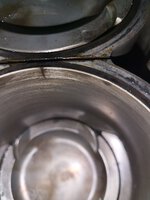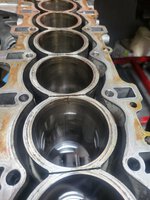Technical These n54 blocks are frigging weak.
- Thread starter martymil
- Start date
You are using an out of date browser. It may not display this or other websites correctly.
You should upgrade or use an alternative browser.
You should upgrade or use an alternative browser.
Were you having symptoms attributed to this, or were you in there for something else and noticed the cracks?
It felt like it had a funny idle and spitting a bit of water out of the exhaust after a trackday.
I was logging through out the whole day and was checking every session.
There was nothing and logs where clean as.
I was logging through out the whole day and was checking every session.
There was nothing and logs where clean as.
Nothing to do with washers, the motor is making like 650hp on 93, high heat, high cylinder pressures and after extended track use that day and 46k km she had enough.Probably used the wrong washers
I'd I didn't track it would have held for a long time.
Wonder what mine looks like. Similar power with the N53 twins setup and like 4psi lower peak. Think it was pressure that did it or heat?
Was this motor running desensitized knock sensors on it? If so, I wonder if there was maybe some low level pinging that wasn't getting detectedNothing to do with washers, the motor is making like 650hp on 93, high heat, high cylinder pressures and after extended track use that day and 46k km she had enough.
I'd I didn't track it would have held for a long time.
Its EGT. 93 octane creates lots of timing retardations, retardation increases heat in chamber and we see cracks. He needs meth or e85 to to track his car or buy m4 closed deck.Wonder what mine looks like. Similar power with the N53 twins setup and like 4psi lower peak. Think it was pressure that did it or heat?
not related to knock.Was this motor running desensitized knock sensors on it? If so, I wonder if there was maybe some low level pinging that wasn't getting detected?
The timing retardation from the DME's correction raises exhaust gas temp, but it reduces the temp in the cylinder. It's the ping/knock event (that the DME responds to with a timing correction) that spikes cylinder pressure and temp.Its EGT. 93 octane creates lots of timing retardations, retardation increases heat in chamber and we see cracks. He needs meth or e85 to to track his car or buy m4 closed deck.
If you look at the thermodynamics of an ignition event, the fuel charge has a given amount of energy. More energy is added when the piston compresses the air/fuel charge. After ignition, a certain portion of energy is lost due to heat absorbed by the cooling system (head, sleeves, piston, etc.), another portion converts to work pushing the piston, and whatever energy is left over goes out the exhaust as heat.
If you're running at MBT, and all of a sudden the DME cuts timing, now there is less time for the combustion event to transfer heat to the engine components (head, plugs, sleeves, etc.), and less time to convert energy to work moving the piston (less power). But this also means there is now more energy left over that escapes in the form of hotter exhaust gas. This is why the timing correction raises EGT.
So when you're getting a lot of timing corrections, what's hard on the motor and adds heat to its internals is the ping/knock event, as this spikes cylinder pressure. The DME's timing correction counteracts this at the expense of higher EGT. So if your knock sensors aren't calibrated correctly, you can be having that low level ping/knock but the DME may not be correcting for it - raising the temp of your internal engine components.
Nice. Yeah, you got the idea. Not seeing knocks in logs doesn't mean no knocks or corrections. "Spitting a bit of water out of the exhaust after a trackday" - sounds like hes got cats on place or something which is horrible.The timing retardation from the DME's correction raises exhaust gas temp, but it reduces the temp in the cylinder. It's the ping/knock event (that the DME responds to with a timing correction) that spikes cylinder pressure and temp.
If you look at the thermodynamics of an ignition event, the fuel charge has a given amount of energy. More energy is added when the piston compresses the air/fuel charge. After ignition, a certain portion of energy is lost due to heat absorbed by the cooling system (head, sleeves, piston, etc.), another portion converts to work pushing the piston, and whatever energy is left over goes out the exhaust as heat.
If you're running at MBT, and all of a sudden the DME cuts timing, now there is less time for the combustion event to transfer heat to the engine components (head, plugs, sleeves, etc.), and less time to convert energy to work moving the piston (less power). But this also means there is now more energy left over that escapes in the form of hotter exhaust gas. This is why the timing correction raises EGT.
So when you're getting a lot of timing corrections, what's hard on the motor and adds heat to its internals is the ping/knock event, as this spikes cylinder pressure. The DME's timing correction counteracts this at the expense of higher EGT. So if your knock sensors aren't calibrated correctly, you can be having that low level ping/knock but the DME may not be correcting for it - raising the temp of your internal engine components.
I was running e30 at the track and only 6 deg of timing no major timing corrections except the occasional 2 deg pull on cylinder 5.
Pistons are perfect and so are the bearings like new with no sign of misfires or pinging.
Blocks are just weak for extended track use.
Pistons are perfect and so are the bearings like new with no sign of misfires or pinging.
Blocks are just weak for extended track use.
If there was knock you would see heavy wear on the rod bearings but the are pristine and like new.
No desentised tables.
No desentised tables.
I was running e30 at the track and only 6 deg of timing no major timing corrections except the occasional 2 deg pull on cylinder 5.
Pistons are perfect and so are the bearings like new with no sign of misfires or pinging.
Blocks are just weak for extended track use.
Interesting, so the groove between the cylinder bores is only LCI blocks as bakerdou mentioned above?
Older blocks less likely to suffer this issue?
edit: No related but are you still on Nulon oil? I've been a believer of the stuff for sometime.
Last edited:
Interesting, so the groove between the cylinder bores is only LCI blocks as bakerdou mentioned above?
Older blocks less likely to suffer this issue?
edit: No related but are you still on Nulon oil? I've been a believer of the stuff for sometime.
All n54 blocks are the same as far as I know the only difference is 6 or 8 bolt crank.
Similar threads
- Replies
- 25
- Views
- 1K
- Replies
- 1
- Views
- 395



